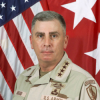John Abizaid

John Abizaid
John Philip Abizaidis a retired United States Army general and former U.S. Central Commandcommander, overseeing American military operations in a 27-country region, from the Horn of Africa, the Arabian Peninsula, to South and Central Asia, covering much of the Middle East. CENTCOM oversees 250,000 US troops. Abizaid succeeded General Tommy Franks as Commander, USCENTCOM, on July 7, 2003, and was also elevated to the rank of four-star general the same week. He was succeeded by Admiral William J. Fallon on...
NationalityAmerican
ProfessionSoldier
Date of Birth1 April 1951
CountryUnited States of America
Why (anyone) would want to move against us in an overt manner that would cause us to use our air or naval power against them would be beyond me... We can generate more military power per square inch than anybody else on Earth, and everybody knows it... If you ever even contemplate our nuclear capability, it should give everybody the clear understanding that there is no power that can match the United States militarily,
Now, people will say, 'Well, that's a very small number,' but when you understand that they're organized in cellular structure, that they have a brutal and determined cadre, that they know how to operate covertly, they have access to a lot of money and a lot of ammunition, you'll understand how dangerous they are,
Every American soldier wants as much public support as he can possibly have. That's the soldiers on duty in Iraq, and that's me, as well. We fight better knowing that our people back home support us, back us, and understand what we're doing. It's hugely important.
Clearly, we understand that we've got an enemy that's in for the long term, al-Qaida and the associated groups that are aligned with it, ... We know that they've got a long-term strategy to fight, to gain ground, to gain influence. And it's very very clear that we've got to have the same sort of long term strategy to contest it. But the keystone to this strategy is helping the people in the region help themselves.
I do think there is a general lack of understanding in the United States as to how it's going,
We've got to get more senior Iraqis involved -- former military types -- involved in the Iraq security forces, ... In the next couple of days, you'll see a large number of senior officers being appointed to key positions in the Ministry of Defense and the Iraqi joint-staff and in Iraqi field commands.
Yet, we believe that that's probably the vigilance of Iraqi security forces and some of our proactive measures the night before probably saved lives.
What I've asked for is essentially to have a strong mobile combat arms capability, ... That's probably about two brigades worth of combat power, if not more.
We certainly will take whatever military action we need to defend ourselves and to prevent the enemy from taking advantage there,
We have decided to make sure that we're cautious about how we're operating, and I have nothing to say further than that,
Boots per square inch is not the issue. You have to have solid intelligence in a conflict such as this, so you can get to the terrorists,
There is always a possibility that things could deteriorate,
The real target is creating enough chaos in Iraq so that an extremist government can emerge there that would be friendly and conducive to the form of ideology that bin Laden, Zawahiri and Zarqawi believe in.
There are a lot of people in the Middle East who believe our weakness is our inability to stay the course, and they believe that two casualties today, two casualties tomorrow, four the next day, will eventually drive us out,